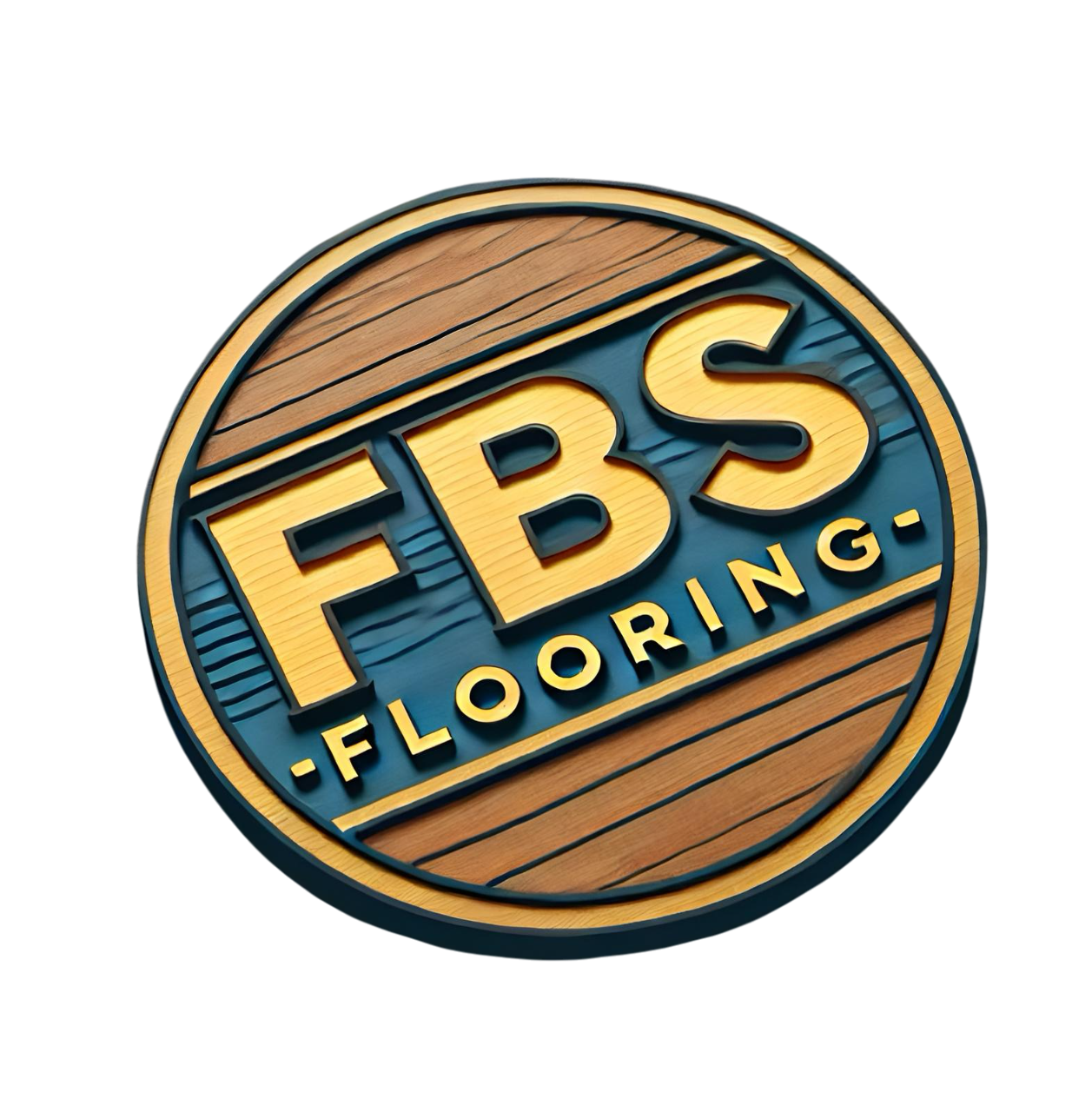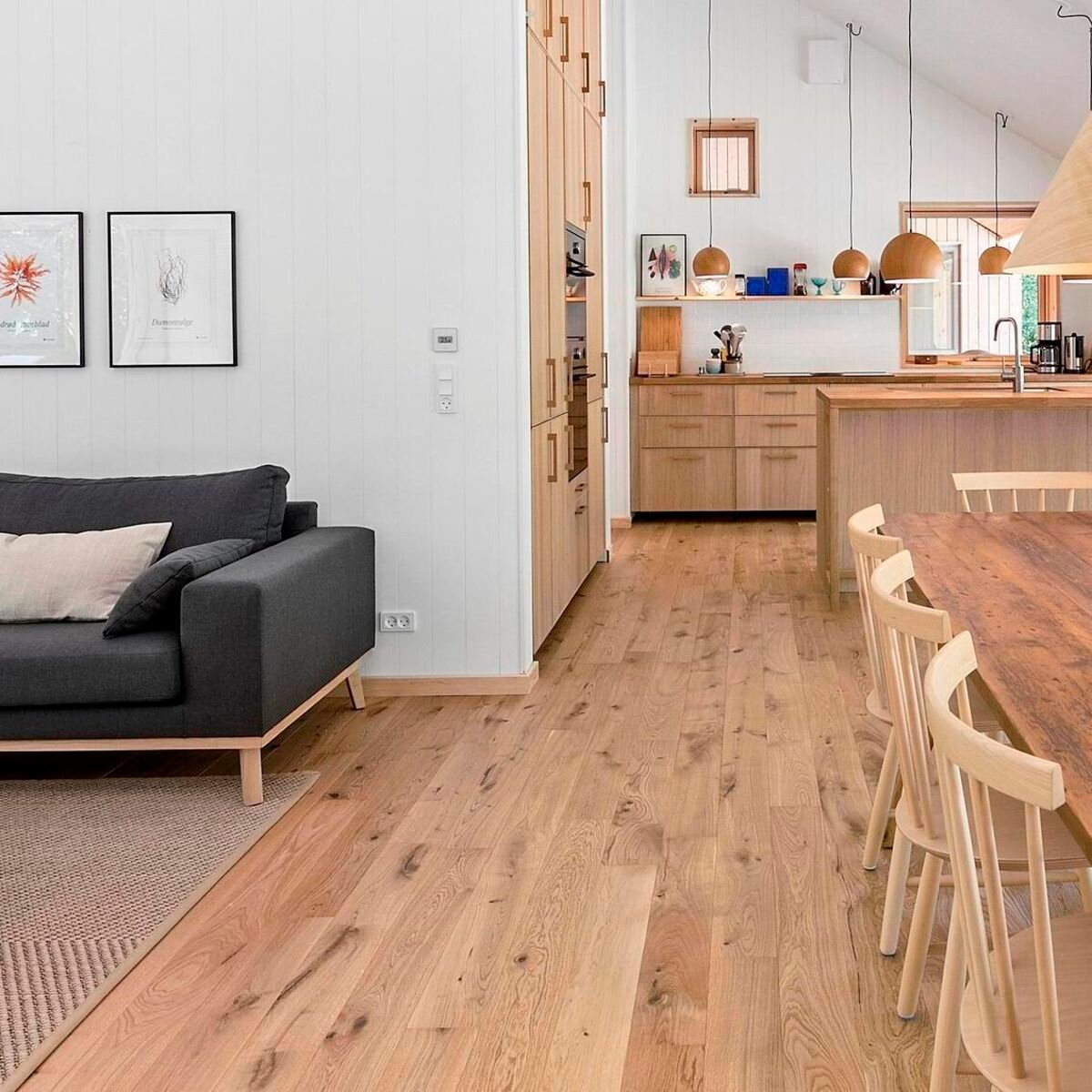If you’re planning a commercial flooring project in Dublin, this guide will give you clarity on materials, costs, installation, compliance, and maintenance, so you can avoid delays and costly mistakes.
Why flooring decisions matter
Flooring is one of the hardest-working elements of any commercial space. It determines how safe an environment is, how quiet or noisy it feels, how easy it is to clean, and how well it holds up against constant wear. In Dublin, where commercial property costs are high and downtime is expensive, choosing the wrong floor can quickly eat into profits.
Unlike many generic flooring articles, this guide is built with a problem–solution logic:
- We start by identifying the common challenges in Dublin commercial projects.
- We then map flooring materials to those challenges, explaining strengths and weaknesses.
- Finally, we break down costs, compliance, and installation steps into plain, usable guidance.
The Dublin factor: why it’s different
Dublin presents a unique environment for commercial flooring projects:
- Moisture risk: Frequent rain and older building stock often mean damp slabs and basements. Without testing and damp-proofing, flooring can fail.
- Tight deadlines: Fit-outs in offices, cafés, and retail spaces are often squeezed into 2–6 week schedules, requiring modular or quick-curing floors.
- Mixed property types: From 18th-century Georgian houses converted into offices, to 1970s schools and modern Docklands towers, each property type demands different flooring solutions.
- Logistics & access: Narrow staircases, laneways, and multi-tenant lifts complicate material delivery; modular tiles are often the answer.
- Heavy footfall: Grafton Street retail units, Dublin Airport concourses, and busy hospitality venues need high-wear, slip-resistant finishes.
- Acoustics: Open-plan offices, shared workspaces, and mixed-use buildings mean sound reduction is increasingly a client priority.
Who should use this guide?
This handbook is designed for:
- Business owners refurbishing cafés, pubs, shops, or offices.
- Property managers in schools, hospitals, and logistics centres.
- Architects and designers who need Dublin-specific specifications.
- Contractors and builders are preparing flooring tenders.
- Landlords and investors who want long-lasting, low-maintenance flooring.
What this guide will cover
By working through each section, you’ll learn:
- Which flooring materials suit offices, retail, hospitality, healthcare, education, and industrial premises in Dublin?
- How to compare realistic installed costs per square metre.
- The critical steps in subfloor preparation and moisture control.
- How long do different installations take, from carpet tiles to resin?
- Room-by-room specifications tailored to Dublin projects.
- The maintenance schedules that protect flooring investment for the long term.
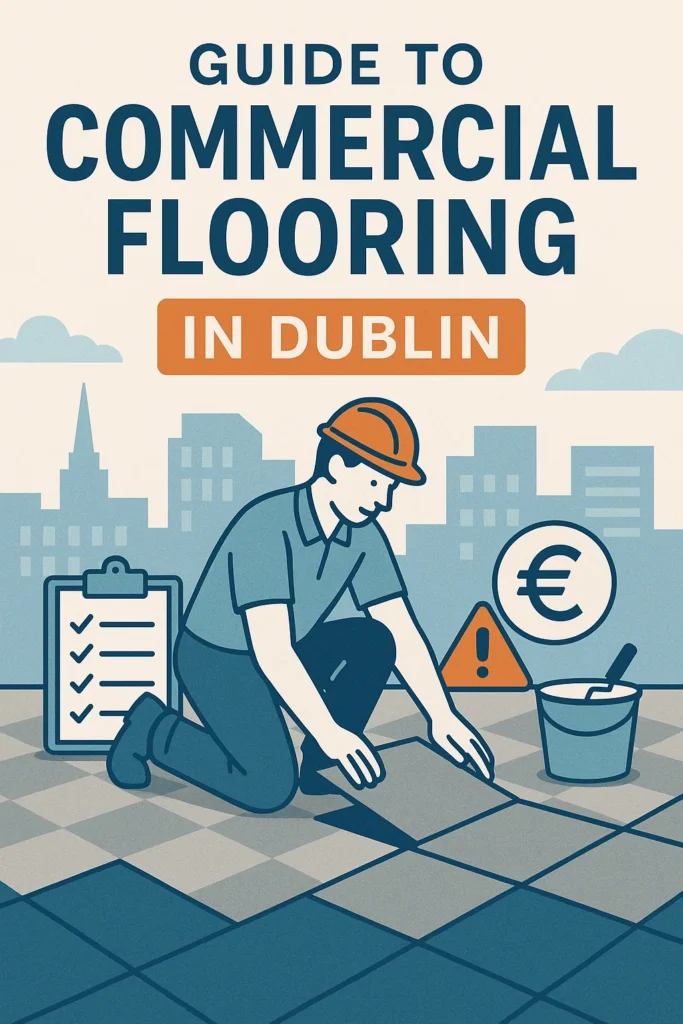
Module 2: Material Deep Dive I: LVT, Carpet Tiles, Porcelain/Stone Tiles
Luxury Vinyl Tile (LVT)
LVT has become the fastest-growing flooring choice in Dublin’s commercial projects. It’s popular in offices, retail units, and hospitality because it delivers durability without sacrificing design.
- Strengths:
- Exceptional wear resistance for high-traffic spaces.
- Available in wood, stone, and abstract finishes, allowing branding flexibility.
- Plank or tile format makes replacement easy if a section is damaged.
- Works well with underfloor heating, increasingly common in new Dublin office and hospitality fit-outs.
- Quick installation compared to porcelain or wood.
- Weaknesses:
- Requires a very flat subfloor; even small imperfections show through.
- Lower-quality LVT can look “plastic” and date quickly.
- Needs an acoustic underlay in open offices to reduce impact sound.
- Where to use in Dublin:
- Open-plan offices in Docklands (fast to install, acoustic backing available).
- Retail chains on Grafton Street or Henry Street (durable, easy plank replacement).
- Hotel rooms and corridors (quiet underfoot, design-led look).
- Example cost (Dublin installed): €40–€85 per m².
- Typical lifespan: 10–20 years, depending on wear layer and maintenance.
Carpet Tiles
Carpet tiles remain the standard office flooring solution in Dublin, especially for tech headquarters and financial services. They combine acoustic control with modularity, which is critical in spaces where downtime must be minimal.
- Strengths:
- Outstanding acoustic absorption, reducing noise in open-plan environments.
- Modular replacement allows a damaged tile to be swapped without disrupting business.
- Thousands of design options, including custom branding and colour zoning.
- Comfortable underfoot for staff working long hours.
- Weaknesses:
- Spills and stains remain a vulnerability, especially in food service zones.
- Requires regular deep cleaning to maintain a professional look.
- Less durable in very high-traffic retail compared to LVT or porcelain.
- Where to use in Dublin:
- Corporate offices in Grand Canal Dock and Sandyford (quiet and professional finish).
- Libraries and learning centres in schools and universities (soft, acoustic-friendly).
- Meeting rooms where branding and comfort are priorities.
- Example cost (Dublin installed): €25–€55 per m².
- Typical lifespan: 7–15 years, depending on traffic and cleaning regime.
Porcelain & Stone Tiles
Porcelain and stone remain the premium choice for high-traffic and client-facing areas in Dublin, especially in hospitality and retail. They withstand constant use, heavy cleaning, and bring a luxury feel.
- Strengths:
- Extreme durability, suitable for heavy footfall.
- Premium, long-lasting aesthetic—ideal for branding front-of-house spaces.
- Easy to clean and resistant to most stains.
- Textured finishes reduce slip risks in wet conditions.
- Weaknesses:
- Cold and hard underfoot, not suitable for all workspaces.
- Installation requires longer programmes (grouting, curing, movement joints).
- Risk of slips if a polished finish is chosen instead of a textured.
- Expensive compared to vinyl or carpet.
- Where to use in Dublin:
- Hotel lobbies (premium impression, long-term durability).
- Retail entrances in the city centre (handles heavy winter footfall).
- Restaurant bathrooms (slip-resistant textured porcelain).
- Example cost (Dublin installed): €75–€140 per m².
- Typical lifespan: 20–40 years with proper maintenance.
| Material | Cost Range (€/m²) | Strengths | Weaknesses | Best Use Cases |
|---|---|---|---|---|
| LVT | 40–85 | Design flexibility, fast install | Needs a flat subfloor, may need an underlay | Offices, retail, hotels |
| Carpet Tiles | 25–55 | Acoustic, modular replacement | Stain-prone, deep cleaning required | Offices, libraries |
| Porcelain | 75–140 | Very durable, premium aesthetic | Cold, hard, expensive | Retail, hospitality |
Dublin Tip
When specifying flooring for high-traffic Dublin environments like Temple Bar pubs or Grafton Street retail, always prioritise slip resistance and cleanability over aesthetics. The cost of a slip accident or failed inspection is far higher than any design compromise.
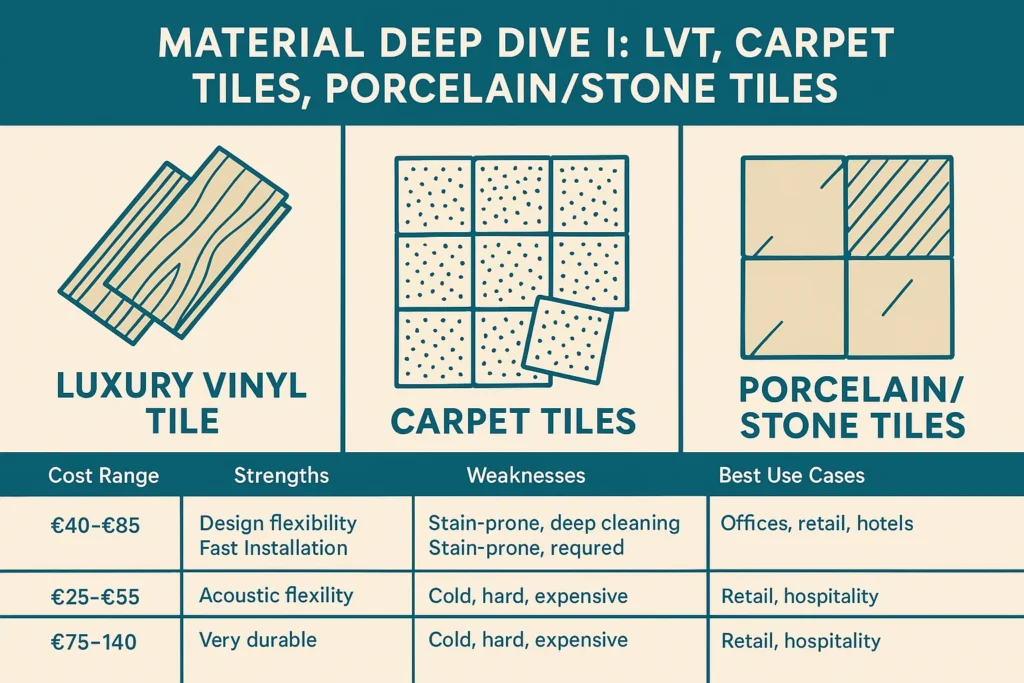
Module 3: Material Deep Dive II: Safety Vinyl, Vinyl Sheet, Rubber, Linoleum, Engineered Wood
Safety Vinyl
In Dublin, safety vinyl is the go-to choice for kitchens, bathrooms, and any environment exposed to water, grease, or chemicals. It’s heavily used in hospitality, healthcare, and back-of-house areas.
- Strengths:
- Slip resistance (R10–R12 ratings) ensures compliance with health and safety.
- Seam-welded joints prevent dirt and bacteria from building up.
- Can be installed with coved skirting for hygienic upturns.
- Works well in small, awkward spaces.
- Weaknesses:
- Industrial look—usually hidden from front-of-house.
- Requires skilled installers for welding and finishing.
- It can feel hard underfoot compared to carpet or LVT.
- Where to use in Dublin:
- Restaurant kitchens in Rathmines or Temple Bar.
- Healthcare treatment rooms where hygiene is paramount.
- School toilets and changing areas.
- Example cost (Dublin installed): €45–€95 per m².
- Lifespan: 10–20 years with correct cleaning.
Vinyl Sheet (Heterogeneous & Homogeneous)
Vinyl sheet flooring is a staple in Dublin’s hospitals, laboratories, and schools due to its hygienic, seamless surface.
- Strengths:
- Welded seams create a watertight surface.
- Wide colour options help with zoning and wayfinding.
- Homogeneous vinyl (single layer) withstands heavy cleaning and traffic.
- Compatible with coved skirtings for full hygiene protection.
- Weaknesses:
- Subfloor must be perfectly smooth—any unevenness shows.
- Skilled installers are essential.
- Less design variety than LVT.
- Where to use in Dublin:
- Hospitals and clinics (St. James’s, Beaumont).
- Schools and universities need durable, hygienic finishes.
- Laboratories requiring chemical resistance.
- Example cost (Dublin installed): €40–€90 per m².
- Lifespan: 15–25 years with proper maintenance.
Rubber Flooring
Rubber flooring is less common than vinyl but is prized in schools, transport hubs, and public buildings for its resilience and slip resistance.
- Strengths:
- Extremely tough and impact-resistant.
- Naturally slip-resistant, even when wet.
- Quiet underfoot—ideal for corridors and stairwells.
- Long lifespan if properly maintained.
- Weaknesses:
- Higher upfront cost compared to vinyl.
- Colour fading is possible in areas with strong sunlight.
- Requires skilled installation.
- Where to use in Dublin:
- Educational buildings like UCD or Trinity College.
- Public transport stations (e.g., Luas or DART access points).
- Stair treads in schools or civic centres.
- Example cost (Dublin installed): €50–€100 per m².
- Lifespan: 20–30 years.
Linoleum (Natural Flooring)
Linoleum is a bio-based flooring made from natural materials (linseed oil, cork dust, wood flour). It’s highly sustainable and popular in schools, healthcare, and civic buildings in Dublin.
- Strengths:
- Sustainable and eco-friendly.
- Antimicrobial surface options are available.
- Resilient and comfortable underfoot.
- Wide colour range for zoning and design.
- Weaknesses:
- Needs sealing during installation.
- Prone to scuffs if not protected with a surface coating.
- Requires regular care to maintain the finish.
- Where to use in Dublin:
- Primary and secondary schools across the city.
- Healthcare centres for durable hygiene control.
- Civic buildings like libraries and council offices.
- Example cost (Dublin installed): €35–€70 per m².
- Lifespan: 20–30 years.
Engineered Wood
Engineered wood is chosen when clients demand a premium look in offices, retail, or hospitality. It brings warmth and luxury but needs careful management in Dublin’s damp climate.
- Strengths:
- Prestigious, natural appearance.
- It can be refinished multiple times.
- Works with underfloor heating.
- Adds value in high-end projects.
- Weaknesses:
- Sensitive to moisture and humidity.
- Needs controlled cleaning (avoid excess water).
- More expensive to install and maintain.
- Where to use in Dublin:
- Boardrooms in corporate HQs.
- Luxury boutiques in Grafton Street.
- Hotel lounges and restaurants.
- Example cost (Dublin installed): €45–€110 per m².
- Lifespan: 20–35 years (with refinishing).
| Material | Cost Range (€/m²) | Strengths | Weaknesses | Best Use Cases |
|---|---|---|---|---|
| Safety Vinyl | 45–95 | Slip-resistant, hygienic | Industrial look, needs welding | Kitchens, wet areas |
| Vinyl Sheet | 40–90 | Seamless, hygienic, durable | Needs smooth subfloor, skilled fitters | Healthcare, schools |
| Rubber | 50–100 | Resilient, quiet, long life | Expensive, UV fade possible | Education, transport hubs |
| Linoleum | 35–70 | Sustainable, antimicrobial | Needs sealing, prone to scuffs | Schools, clinics |
| Engineered Wood | 45–110 | Premium look, refinishable | Sensitive to moisture, costly | Needs a smooth subfloor, skilled fitters |
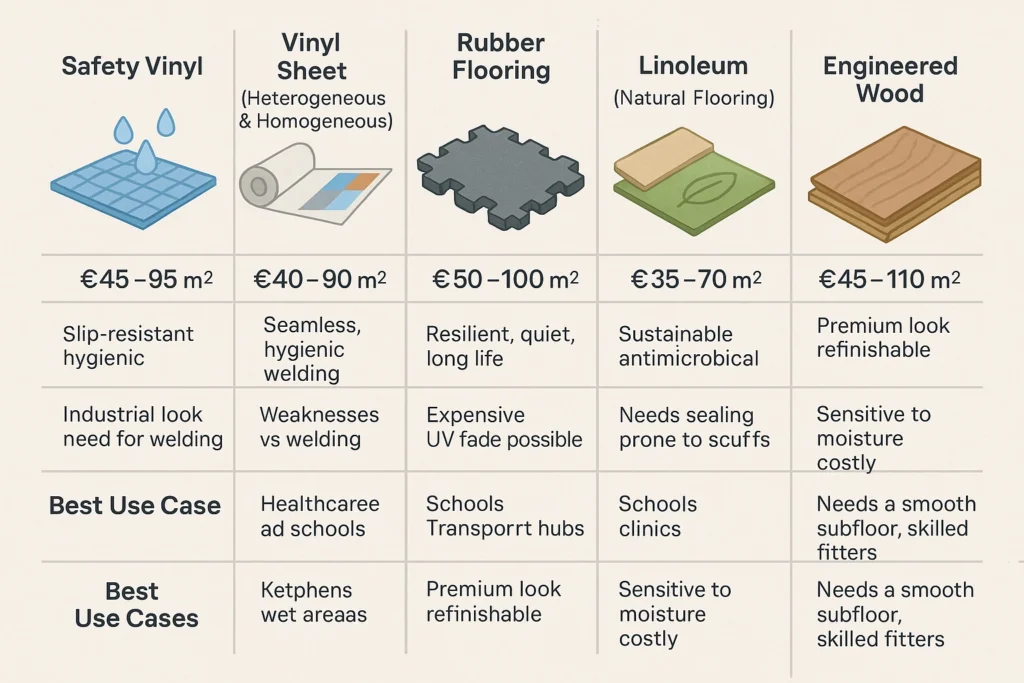
Module 3: Industrial & Specialist Floors: Resin, Polished Concrete, Hybrid Systems
Resin Flooring (Epoxy, Polyurethane, MMA)
Resin systems are the backbone of industrial flooring in Dublin, particularly in food production, warehousing, logistics, and laboratory environments. They are chosen for their seamless finish, chemical resistance, and load-bearing strength.
Epoxy Resin
- Strengths:
- High compressive strength for forklifts and pallets.
- Seamless, easy to clean, excellent chemical resistance.
- It can be customised with colours, safety lines, and textures.
- Weaknesses:
- Cure time can be long (24–48 hours).
- Prone to UV yellowing unless coated with polyurethane.
- Where used in Dublin:
- Pharmaceutical labs in Grange Castle.
- Warehouse distribution centres in Ballycoolin.
- Cost: €60–€110 per m².
- Lifespan: 10–20 years.
Polyurethane (PU) Resin
- Strengths:
- Handles thermal shock—ideal for kitchens with hot water cleaning.
- Flexible, impact-resistant, long lifespan.
- Weaknesses:
- Higher cost than epoxy.
- Installation requires specialist teams.
- Where used in Dublin:
- Commercial kitchens in hotels and restaurants.
- Food processing plants.
- Cost: €70–€120 per m².
- Lifespan: 15–25 years.
Methyl Methacrylate (MMA) Resin
- Strengths:
- Extremely fast curing—can be ready within hours.
- Ideal for projects with no downtime tolerance.
- Weaknesses:
- Strong odour during installation.
- Specialist installers only.
- Where used in Dublin:
- Airports for quick overnight refurbishments.
- Retail back-of-house areas with tight turnaround needs.
- Cost: €80–€130 per m².
- Lifespan: 10–15 years.
Polished Concrete
Polished concrete has become a design-led trend in Dublin’s showrooms, cafés, and tech offices. It combines industrial toughness with a modern minimalist aesthetic.
- Strengths:
- Extremely durable and low-maintenance.
- Natural stone-like look without additional coverings.
- Can be sealed or densified for stain resistance.
- Weaknesses:
- Hard and cold underfoot, poor acoustics.
- Visible joints and cracks unless properly prepared.
- A reflective surface can increase glare.
- Where used in Dublin:
- Showrooms in Sandyford and Blanchardstown.
- Cafés in Temple Bar and Ranelagh.
- Tech campuses in Docklands.
- Cost: €40–€90 per m².
- Lifespan: 20–40 years.
Hybrid Systems (Concrete + Resin Overlays)
Hybrid systems are increasingly specified in Dublin, where durability and speed of installation must be balanced. For example, a polished concrete slab may be coated with a thin polyurethane resin for added slip resistance and chemical protection.
- Strengths:
- Combines aesthetics with durability.
- Faster to install than full resin builds.
- Can incorporate branding, colours, and safety lines.
- Weaknesses:
- Costs can rise with customisation.
- Requires precise subfloor prep.
- Where used in Dublin:
- Mixed-use retail/warehouse units.
- Car parks need slip resistance and durability.
- Cost: €55–€100 per m².
- Lifespan: 15–25 years.
Industrial Flooring Priorities in Dublin
- Load Bearing: Warehouses in Dublin Airport Logistics Park demand floors that withstand forklifts, pallets, and heavy loads.
- Chemical Resistance: Breweries, labs, and food plants require surfaces that resist acids, oils, and solvents.
- Slip Resistance: Safety is non-negotiable; R12+ slip ratings are common in kitchens and industrial wet zones.
- Fast Turnaround: Many industrial clients cannot afford long shutdowns—MMA and hybrid overlays allow weekend or overnight installs.
- Hygiene: Food and healthcare sectors require seamless, easy-to-clean surfaces.
| Material | Cost Range (€/m²) | Strengths | Weaknesses | Best Use Cases |
|---|---|---|---|---|
| Epoxy Resin | 60–110 | Durable, chemical-resistant | UV yellowing, cure time | Warehouses, labs |
| PU Resin | 70–120 | Thermal shock resistant, flexible | Higher cost, specialist install | Kitchens, food plants |
| MMA Resin | 80–130 | Fast cure, minimal downtime | Strong odour, costly | Airports, retail BOH |
| Polished Concrete | 40–90 | Long life, modern aesthetic | Cold, reflective, cracks visible | Cafés, showrooms |
| Hybrid Systems | 55–100 | Balance of speed + durability | Prep critical, costs vary | Car parks, mixed-use |
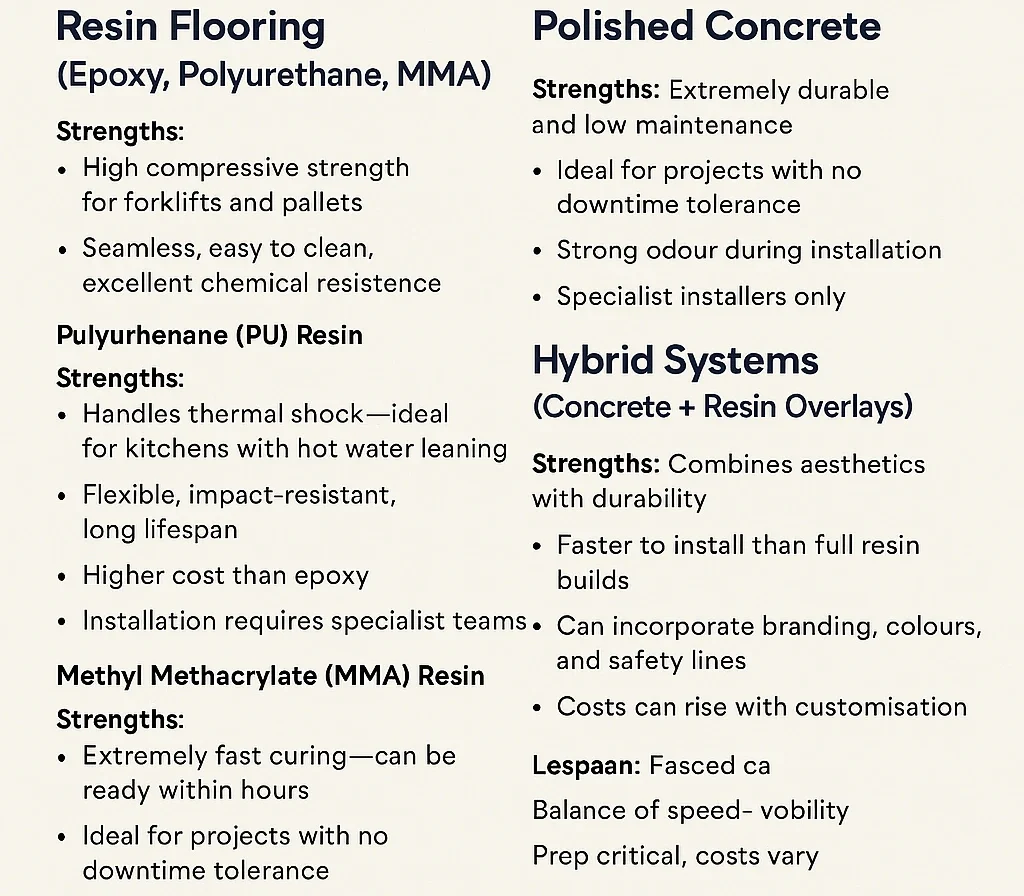
Module 4: Costs & Budgeting in Dublin
Why accurate budgeting matters
Flooring is one of the largest cost components in any fit-out or refurbishment project. In Dublin, where construction and labour costs have risen steadily over the past decade, underestimating flooring expenses can derail an entire project budget.
The key drivers of cost are:
- Material choice (LVT vs porcelain vs resin, etc.).
- Labour intensity (tile grouting vs click-install LVT).
- Subfloor preparation (levelling, moisture barriers).
- Programme speed (weekend/night work increases labour premiums).
- Lifecycle maintenance (cleaning, resealing, repairs).
Installed cost ranges (Dublin market)
These are the average 2025 installed prices (materials + adhesives/underlays + labour + light prep). Heavy prep or specialist finishes can increase costs by 20–40%.
| Material | Installed Cost Range (€/m²) | Notes |
|---|---|---|
| Carpet Tiles | €25–€55 | Backing type and pattern-matching affect cost. |
| LVT | €40–€85 | Stair treads/nosings are usually extra. |
| Safety Vinyl | €45–€95 | Welding and coving increase cost. |
| Vinyl Sheet | €40–€90 | Homogeneous types higher end; flawless skim required. |
| Rubber | €50–€100 | Stair treads/nosings usually extra. |
| Linoleum | €35–€70 | Requires sealing and skilled installers. |
| Porcelain Tile | €75–€140 | Large format = more prep; grouting time adds labour. |
| Resin (Epoxy/PU) | €60–€120 | Thickness and slip rating affect pricing. |
| Engineered Wood | €45–€110 | Grading and plank width impact cost. |
| Polished Concrete | €40–€90 | Dependent on slab condition and joint repairs. |
Breaking down the numbers
1. Materials (40–60% of total cost)
- Entry-level carpet tile: €12–€20/m² for material.
- Premium LVT plank: €25–€40/m².
- Porcelain tile: €40–€70/m².
- Resin systems: €30–€60/m² for raw product.
2. Labour (30–50%)
- Tile installers in Dublin typically cost €200–€280 per day.
- Resin applicators charge premium rates due to specialist training.
- Weekend/night installs add 15–25% to labour costs.
3. Subfloor prep (10–30%)
- Basic skim coat: €5–€10/m².
- Moisture barrier (liquid DPM): €8–€15/m².
- Heavy levelling: €20–€40/m².
Example: 500 m² Office Fit-Out (Carpet Tile + LVT mix)
- Materials: ~€18,000 (50%).
- Labour: ~€12,000 (35%).
- Prep: ~€6,000 (15%).
- Total: ~€36,000 (€72/m² average).
Lifecycle budgeting
Choosing flooring isn’t just about upfront cost. A material with lower annual maintenance costs can be cheaper over 20 years than a cheaper-to-install alternative.
- Carpet tiles: Low upfront, higher cleaning costs (deep extraction needed).
- LVT: Moderate upfront, low annual maintenance.
- Porcelain: High upfront, very low ongoing costs.
- Resin: Moderate upfront, resealing required every 5–7 years.
- Linoleum/rubber: Moderate upfront, low-cost if maintained correctly.
Annual maintenance cost guideline (as % of installed value):
- Carpet tile: 3–6%
- LVT: 2–4%
- Porcelain: 1–3%
- Resin: 2–5%
- Linoleum/rubber: 2–4%
Cost case examples (Dublin projects)
Case 1: Café refurbishment, 150 m² (Temple Bar)
- Safety vinyl in kitchen: €70/m² installed.
- Porcelain tiles in the customer area: €120/m² installed.
- Total cost: ~€15,000 (materials + labour).
- Payback: durable, easy to clean, passes HSE inspections.
Project 2: Tech office, 1,200 m² (Docklands)
- Carpet tiles in open plan: €45/m² installed.
- LVT in tea points and corridors: €65/m² installed.
- Subfloor levelling added €10/m².
- Total cost: ~€62,000.
- Value: quick install, modular replacements reduce downtime.
Case 3: Warehouse, 800 m² (Dublin Airport Logistics Park)
- Epoxy resin: €85/m² installed.
- Moisture barrier required (€12/m²).
- Total cost: ~€78,000.
- Value: seamless, forklift-ready, long lifespan.
How to control costs in Dublin
- Always test moisture early – DPMs are cheaper upfront than fixing failed floors.
- Specify modular where possible – Carpet tiles, LVT planks = cheaper repairs.
- Avoid complex layouts – Herringbone, diagonal, or patterned tile layouts add 15–20% labour.
- Plan deliveries carefully – Narrow streets and lift-only access can delay installs.
- Factor protection – Damage by follow-on trades is common; budget for protection sheets post-install.
Dublin Tip
When tendering, ask contractors to split out material, labour, and prep costs. Many quotes hide subfloor prep as “contingency.” By itemising, you can compare fairly and avoid nasty surprises when levelling or DPMs are added later.
Module 5: Installation Workflows & Timelines
Why installation planning matters
Even the best flooring material will fail if installed incorrectly or rushed. In Dublin, installation challenges are magnified by tight project deadlines, multi-tenant buildings, and old subfloors prone to moisture. Knowing the typical workflow and where delays occur helps you plan realistically and avoid costly overruns.
Standard installation workflow
A professional Dublin flooring contractor will typically follow these steps, and we at FBS Flooring ensure for the best services:
- Survey & Site Inspection
- Assess subfloor type (concrete, timber, raised access).
- Measure moisture levels with in-situ RH testing.
- Check flatness and structural joints.
- Review logistics (access, lifts, parking).
- Moisture & Subfloor Prep
- Apply liquid DPM if required.
- Repair cracks and movement joints.
- Apply self-leveling screed (aim ±3 mm flatness over 2 m).
- Dry Fit & Layout
- Mark reference lines for tile/plank layout.
- Test transitions at doors, thresholds, and expansion joints.
- Installation
- Spread adhesive or apply a click/loose-lay system.
- Roll or press flooring for full bond.
- Seam weld (vinyl, linoleum) or grout (tile).
- Install trims, nosings, and covings.
- Protection
- Lay temporary protection sheets if other trades follow.
- Ensure cleaning staff use the correct methods immediately.
- Snagging & Handover
- The contractor walks the site with the client.
- Issues noted (loose edges, bubbles, poor transitions).
- O&M, manual provided with maintenance instructions.
Indicative installation durations (Dublin market)
Based on 1,000 m² area, good access, and light prep:
- Carpet tile: 2–4 days (modular, fastest).
- LVT: 4–7 days (includes skim coat drying).
- Safety vinyl: 5–8 days (welding, coving adds time).
- Vinyl sheet: 5–9 days (subfloor prep critical).
- Porcelain tile: 6–10 days (grouting, curing required).
- Resin (Epoxy/PU): 3–5 days (longer for thick builds).
- MMA resin: 1–2 days (ultra-fast cure).
- Polished concrete: 5–8 days (grinding, sealing, curing).
- Engineered wood: 5–9 days (acclimatisation before fitting).
Common causes of delay
- Moisture issues
- Subfloors often fail RH tests. Waiting for drying or applying DPM can add 2–3 days.
- Late prep works
- If levelling or screeds are rushed, bubbles or curling appear. Fixes add days or weeks.
- Access restrictions
- Central Dublin sites with no parking or narrow staircases slow material delivery.
- Other trades
- Painters, electricians, or ceiling contractors working simultaneously can damage fresh flooring.
- Weather (for deliveries)
- Heavy rain complicates deliveries of sheet materials or polished concrete work.
Coordination with other trades
In Dublin projects, flooring is usually one of the last trades before furniture installation. This creates bottlenecks.
- Tip 1: Agree on a clear “flooring zone handover” date with the main contractor.
- Tip 2: Insist on a clean, dust-free site before installation (dust weakens adhesives).
- Tip 3: Schedule protection sheets if joinery or furniture will be moved in after the flooring.
Case Example: Office Fit-Out, 800 m² (Docklands)
- Planned programme: 3 weeks for flooring.
- Reality: Moisture tests delayed start by 4 days.
- Actual install:
- Carpet tile (open office) — 3 days.
- LVT (tea points, reception) — 4 days.
- Protection & snagging — 2 days.
- Total: 13 days.
- Lesson: Buffer planning avoided penalties; client occupied on time.
Protection after installation
One of the most overlooked stages in Dublin projects is protection. Many failures happen not during installation but in the weeks after, when other trades scratch or stain fresh floors.
- Best practice: Lay the protection board immediately after installation.
- Duration: Protection should stay in place until Practical Completion.
- Cost: Typically €2–€4 per m², worth the investment compared to replacing damaged flooring.
Dublin Tip
Always build a 15–20% buffer into your flooring programme. Landlords and contractors in Dublin are notorious for compressing timelines, but flooring adhesives, screeds, and resins cannot be rushed. If rushed, failures are almost guaranteed, and remedial works are far more disruptive than waiting a day for proper curing.
Module 6: Room-by-Room Specifications in Dublin
Why room-specific flooring matters
Not all spaces are created equal. The floor that works in a Docklands boardroom won’t suit a Temple Bar pub kitchen. In Dublin, with its mix of historic buildings, modern offices, schools, hospitals, and industrial estates, each space demands flooring that balances durability, compliance, and maintenance.
Offices
Open-Plan Work Areas
- Best choice: Carpet tiles (acoustic, modular) or LVT with acoustic underlay.
- Why: Noise reduction is critical in Dublin’s open offices. Carpet tiles also allow easy replacement in case of spills.
- Costs: Carpet tile €25–€55/m²; LVT €40–€85/m².
Meeting Rooms
- Best choice: Carpet tile for quiet, professional atmosphere.
- Why: Comfort underfoot, design flexibility for zoning.
Reception Areas
- Best choice: LVT or porcelain tile.
- Why: Needs to impress clients, handle heavy footfall, and allow easy cleaning.
- Costs: Porcelain €75–€140/m².
Tea Points/Kitchenettes
- Best choice: Safety vinyl or LVT with slip-resistant finish.
- Why: Water spills are common; safety compliance is needed.
Retail
Front-of-House
- Best choice: Porcelain tile or high-durability LVT.
- Why: Handles heavy footfall, maintains a premium aesthetic for customers.
- Tip: Always choose textured finishes for entrances in wet Dublin winters.
Changing Rooms
- Best choice: LVT with moisture-resistant backing.
- Why: Warm feel underfoot, easy to clean.
Stock Rooms
- Best choice: Vinyl or resin.
- Why: Cost-effective, resilient to heavy use, withstands wheeled trolleys.
Hospitality
Hotel Lobbies & Corridors
- Best choice: Porcelain tile in lobby, LVT in corridors.
- Why: Tiles deliver prestige; LVT reduces corridor noise.
Guest Rooms
- Best choice: LVT with acoustic underlay.
- Why: Combines comfort, cleanability, and style.
- Costs: €55–€80/m² installed.
Cafés, Pubs, and Restaurants
- Best choice: Safety vinyl or PU resin in kitchens and bars; porcelain or LVT in seating areas.
- Why: Kitchens require seamless hygiene; FOH demands brand-aligned look.
Function Rooms
- Best choice: Carpet tiles with pattern zoning.
- Why: Acoustic performance and modular replacement after events.
Healthcare
Clinics & Treatment Rooms
- Best choice: Homogeneous vinyl with welded seams and coved skirtings.
- Why: Seamless hygiene, easy disinfection, compliant with HSE audits.
Corridors & Waiting Rooms
- Best choice: Rubber or linoleum.
- Why: Long-lasting, resilient, and slip-resistant.
Operating Theatres/Labs
- Best choice: Chemical-resistant resin or specialist vinyl.
- Why: Must withstand harsh cleaning chemicals and high hygiene demands.
Education
Classrooms
- Best choice: Linoleum or vinyl sheet.
- Why: Durable, sustainable, easy to maintain, available in bright colours for wayfinding.
Libraries & Study Areas
- Best choice: Carpet tiles.
- Why: Acoustic control, comfort for long periods of use.
Sports Halls
- Best choice: Rubber flooring.
- Why: Shock absorption, slip resistance, durability.
Toilets & Changing Rooms
- Best choice: Safety vinyl.
- Why: Slip resistance and hygiene in wet environments.
Industrial & Logistics
Warehouses
- Best choice: Epoxy or PU resin, polished concrete.
- Why: Handles forklift loads, seamless, resistant to oils and chemicals.
- Costs: €60–€110/m² for resin; €40–€90/m² for polished concrete.
Food Production Plants
- Best choice: PU resin.
- Why: Withstands thermal shock from hot washes and steam cleaning.
Car Parks
- Best choice: Resin with slip-resistant aggregates.
- Why: Protects against water ingress, chemicals, and heavy vehicles.
Quick Room-to-Flooring Matrix
| Space Type | Recommended Flooring | Why It Works in Dublin |
|---|---|---|
| Office open plan | Carpet tile / LVT | Noise reduction, modular repair |
| Retail front-of-house | Porcelain / LVT | Durable, premium aesthetic |
| Hotel lobby | Porcelain tile | Prestige, high traffic |
| Guest room | LVT + acoustic underlay | Comfort + durability |
| Café kitchen | Safety vinyl / PU resin | Hygiene, slip resistance |
| School classroom | Linoleum / vinyl sheet | Sustainable, durable |
| Warehouse | Resin / polished concrete | Load-bearing, seamless |
| Hospital clinic | Homogeneous vinyl | Hygiene, compliance |
Dublin Tip
When fitting out multi-use buildings (e.g., retail on the ground floor, offices above), always coordinate flooring choices with the acoustic consultant. Many Dublin mixed-use projects now require documented impact sound reduction (ΔLw values) to satisfy planning permissions.
Module 7: Maintenance & Sustainability in Dublin
Why maintenance is critical
In Dublin’s commercial spaces, flooring is exposed to heavy daily wear: office workers dragging chairs, retail customers bringing in rain-soaked shoes, kitchens enduring grease and hot water spills, and warehouses moving pallets. Without proper maintenance, even premium flooring fails prematurely.
A structured maintenance regime extends lifespan, protects warranties, and keeps floors compliant with safety and hygiene standards.
Daily-to-annual maintenance routines
Daily
- Carpet tiles: Vacuum with HEPA filters to remove grit and dust.
- LVT & vinyl: Damp mop with neutral pH cleaner; avoid bleach.
- Porcelain: Sweep and mop with a non-acidic detergent.
- Resin & concrete: Dry sweep; remove spills immediately.
Weekly
- Machine-scrub LVT and vinyl in high-traffic corridors.
- Bonnet clean carpet tiles in reception areas.
Quarterly
- Deep extraction clean carpet tiles.
- Inspect welded seams, coved skirtings, and stair nosings.
- Reapply protective finish on linoleum or PU-sealed vinyl.
Annually
- Reseal resin or polished concrete.
- Replace heavily worn carpet tiles or LVT planks.
- Review entrance matting efficiency (at least 2–3 m of walk-off matting recommended).
Maintenance case examples (Dublin projects)
- Tech HQ, Docklands: Carpet tiles are replaced modularly every 12–18 months in tea points, but open-plan areas last 7–10 years with proper cleaning.
- Temple Bar Café: Safety vinyl cleaned daily with degreaser; seams and coves inspected quarterly; lifespan extended from 8 years to 15+.
- Logistics Warehouse, Ballymount: Resin resealed every 6 years, extending floor life beyond 20 years with minimal downtime.
The cost of neglect
Skipping maintenance can have severe consequences:
- Carpet tiles: Without cleaning, dirt abrades fibres, reducing lifespan by half.
- Vinyl: Poor cleaning causes dulling and seam failure.
- Porcelain: Wrong cleaners can etch the surface, making it slippery.
- Resin: Without resealing, chemical attack can compromise the structure.
For Dublin landlords, poor maintenance can also void warranties and trigger insurance claims if slip accidents occur.
Sustainability and flooring
Sustainability is no longer optional in Dublin’s property market. Tenants and planning authorities increasingly demand eco-friendly materials and certifications.
Key strategies:
- Durability first
- The greenest floor is one that lasts.
- Example: Porcelain tiles last 30+ years with low maintenance.
- Recycled content
- Many carpet tiles now use recycled nylon.
- Some LVT ranges incorporate recycled PVC.
- Take-back schemes
- Dublin contractors often work with suppliers who collect old carpet tiles and vinyl offcuts for recycling.
- Low-VOC adhesives and finishes
- Important for WELL and LEED certifications in offices.
- Natural materials
- Linoleum remains a strong eco-choice due to bio-based ingredients.
Certifications relevant to Dublin projects
- BREEAM: Common in large office and mixed-use developments.
- LEED: Favoured by multinational tech companies.
- WELL: Health and well-being certification that considers VOC emissions and acoustics.
- EPDs (Environmental Product Declarations): Increasingly requested in tenders.
Dublin market trend: Sustainable flooring
- Many new Dublin office fit-outs specify carpet tiles with 60–80% recycled content.
- Linoleum is making a comeback in schools due to its eco profile and durability.
- Resilient floors with low-VOC adhesives are required in most healthcare refurbishments.
- Retailers on Grafton Street often request long-life porcelain or LVT with recycled backing to balance sustainability with branding.
Lifecycle cost vs eco value
While sustainable products can be slightly more expensive upfront, they usually:
- Reduce energy used in cleaning (e.g., easy-clean surfaces).
- Last longer (linoleum and porcelain outperform cheaper vinyls).
- Help tenants achieve sustainability ratings, boosting property value.
Dublin Tip
When evaluating flooring options, request EPDs and VOC certificates from suppliers. For schools, healthcare, and office projects in Dublin, these documents increasingly determine tender success. Choosing a product without them can disqualify a bid.
Module 10: Extended FAQ: Commercial Flooring Dublin
General FAQs
Q1. What is the most popular flooring for Dublin offices?
Carpet tiles remain the standard, especially in open-plan offices, due to their acoustic properties and modular replacement. LVT is gaining ground in corridors and tea points.
Q2. Is moisture testing really necessary?
Yes. Dublin’s climate and older concrete slabs mean in-situ RH testing is critical. Skipping this step risks adhesive failure and mould.
Q3. Can flooring be installed directly over old surfaces?
Sometimes. If the subfloor is sound, flat, and dry, installation over old vinyl or tiles may work. But levelling and primers are often required.
Q4. How long does flooring installation usually take?
From 2 days (carpet tile, 500 m²) to 10+ days (porcelain tile, 1,000 m²). Resin systems can cure overnight with MMA, while PU/epoxy requires more time.
Q5. Which flooring is most eco-friendly?
Linoleum, recycled-content carpet tiles, and low-VOC resilient floors are best for sustainability. Durability is also eco-friendly — porcelain and rubber last for decades.
Cost & Budget FAQs
Q6. What drives the flooring costs in Dublin the most?
Subfloor preparation and programme constraints. Levelling compounds, DPMs, and night/weekend work can add 20–40% to quotes.
Q7. How can I keep flooring costs under control?
Request itemised quotes, separating material, labour, and prep. Avoid complex patterns unless essential, and consider modular products for cheaper repairs.
Q8. Are porcelain tiles too expensive for small Dublin shops?
They are costly upfront (€75–€140/m² installed) but may save money long-term by lasting 30+ years with low maintenance.
Q9. What’s the cheapest flooring for commercial use?
Carpet tiles (€25–€55/m²) and linoleum (€35–€70/m²) are typically the most budget-friendly installed options.
Q10. Should I budget for maintenance separately?
Yes. Allow 2–6% of installed cost annually for cleaning and repairs, depending on material.
Material-Specific FAQs
Q11. Is LVT suitable for restaurants?
Yes, in dining areas. Kitchens require safety vinyl or resin. LVT is easy to clean and design-led but not suited to grease-heavy environments.
Q12. Do resin floors crack?
If installed correctly over a stable, prepared subfloor, resin floors are extremely durable. Movement joints must always be respected.
Q13. Is polished concrete safe for public use?
Yes, when sealed with anti-slip treatments. It can be too reflective or hard underfoot, so acoustic treatment may be needed in cafés and offices.
Q14. Can engineered wood work in Dublin pubs?
In front-of-house areas, yes, if humidity is managed and wet cleaning is controlled. Avoid in back-of-house or kitchens.
Q15. Which floors handle wheelchair traffic best?
Seamless vinyl sheet, safety vinyl, resin, and LVT with glued-down installation are all excellent for accessibility.
Compliance & Safety FAQs
Q16. What slip resistance rating do I need?
- Entrances: R10 or higher.
- Kitchens: R12.
- Bathrooms: R11–R12 with drainage falls.
Q17. What fire classification is required?
Floors in escape routes and public areas must meet EU/Irish reaction-to-fire standards (often Class Bfl-s1 or better).
Q18. How can I improve acoustics with hard floors?
Use acoustic underlays (LVT, engineered wood) or combine with soft furnishings and ceiling panels. Carpet tiles are still the best acoustic performer.
Q19. What flooring works best for accessibility in schools?
Rubber or linoleum — both provide slip resistance, durability, and visual contrast options.
Q20. How do I avoid slips at Dublin shop entrances?
Install textured porcelain or LVT plus at least 2–3 m of walk-off entrance matting.
Project & Maintenance FAQs
Q21. How long does resin flooring last?
Epoxy: 10–20 years. PU: 15–25 years. MMA: 10–15 years. Lifespan depends on correct prep and resealing.
Q22. How often should carpet tiles be replaced?
With proper cleaning, 7–10 years. In high-traffic zones, replace individual tiles as needed.
Q23. Can vinyl be repaired if damaged?
Yes, but welded seams must be redone professionally. Modular LVT or tiles are easier for spot replacement.
Q24. Do polished concrete floors stain?
If not sealed, yes. Use densifiers and sealers to resist coffee, oil, or wine stains.
Q25. Is underfloor heating compatible with commercial floors?
Yes — LVT, engineered wood, vinyl, and linoleum all work with UFH. Confirm temperature limits with suppliers.
Q26. How do I maintain resin floors in warehouses?
Dry sweep daily, machine scrub weekly, reseal every 5–7 years. Promptly remove oil or chemical spills.
Q27. What’s the most common flooring failure in Dublin?
Moisture-related adhesive failure from untested slabs. Always demand RH testing before installation.
Q28. Do warranties cover poor maintenance?
No. Most warranties require proof of regular cleaning and the correct products. Skipping maintenance voids coverage.
Q29. Can I mix flooring materials in one space?
Yes. Use trims and movement joints between materials. Zoning with colour/texture helps wayfinding.
Q30. What protection is needed after installation?
Lay temporary protection sheets (e.g., Correx) until project completion. Budget €2–€4/m².
Module 8: Conclusion & Call-to-Action
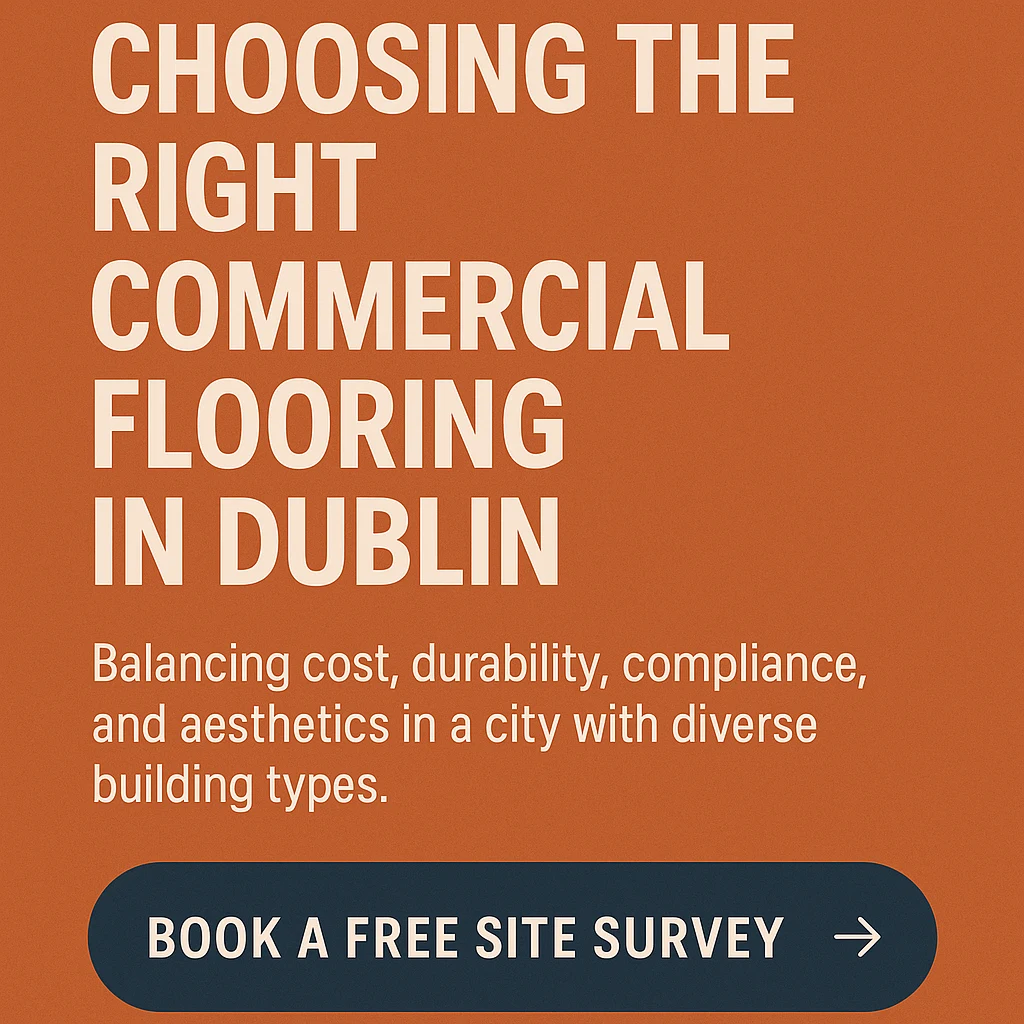
Bringing it all together
Choosing the right commercial flooring in Dublin is not just about colour and design. It’s about balancing cost, durability, compliance, and aesthetics in a city where buildings range from historic Georgian conversions to ultra-modern Docklands towers.
We’ve walked through:
- The pros, cons, and costs of every major flooring material — from carpet tiles and LVT to porcelain, resin, and linoleum.
- How to budget realistically, factoring in materials, labour, and subfloor prep.
- Room-by-room recommendations for offices, retail, hospitality, healthcare, education, and warehouses.
- The importance of installation workflows, moisture testing, and protection.
- Long-term maintenance schedules and sustainability strategies that save money while aligning with Dublin’s eco-conscious market.
- Real-world case studies showing how these choices succeed across Dublin’s diverse commercial sectors.
The Dublin flooring reality
In Dublin, project timelines are often compressed, budgets are under pressure, and compliance standards are high. Flooring mistakes here are expensive. But with the right preparation and material choices, you can achieve floors that:
- Last 10–30 years, not just a few.
- Pass safety and hygiene inspections.
- Support acoustic comfort in open-plan spaces.
- Enhance your brand with design-led finishes.
- Lower your lifecycle costs by reducing maintenance needs.
Next steps for your project
- Define your priorities: durability, budget, acoustics, sustainability, or prestige.
- Match materials to spaces: Use the room-by-room matrix (Module 8) to choose correctly.
- Request itemised quotes: demand breakdowns for materials, labour, and prep.
- Check compliance: confirm slip ratings, fire classifications, and VOC certificates.
- Plan for maintenance: build cleaning and protection into your budget from day one.
Call-to-action (for a flooring company/website)
If you’re planning a flooring project in Dublin, whether a café fit-out in Temple Bar, an office upgrade in Docklands, or a warehouse resin floor near the airport, we can help.
- Book a free site survey today.
- Get a detailed cost estimate per m² with no hidden extras.
- Receive a maintenance guide tailored to your chosen materials.
👉 Contact us now to discuss your commercial flooring project in Dublin. The right choice today will save you time, money, and stress tomorrow.
Dublin Tip
Always treat flooring as a long-term investment. Cheap, rushed installs cost more in repairs, downtime, and safety issues. In Dublin’s competitive property and business market, the smartest move is to choose flooring that combines durability, compliance, and design.
